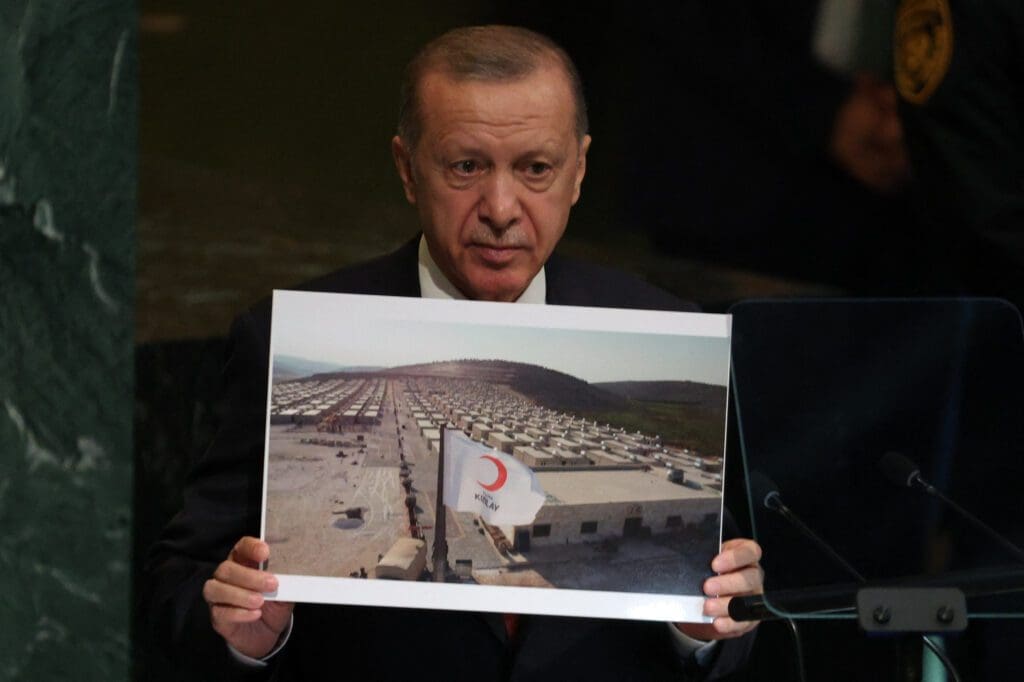The earthquakes that struck Türkiye and Syria in February devastated large areas of both countries, killing over 50,000 people and forcing millions from their homes. It was Türkiye’s worst natural disaster in decades. For Syrian refugees living in the area, it was a double catastrophe. Already forced from their country by war, they now found themselves displaced again, and particularly vulnerable.
The timing could hardly have been worse. Anti-refugee sentiment has been rising in Türkiye, more than a decade after the outbreak of war forced millions of Syrians to seek refuge on Turkish soil. With the country gearing up for presidential and parliamentary elections in May, calls for their expulsion had already become a key opposition rallying cry.
The earthquakes brought tragedy upon Syrians and Turks alike. But their grim shared fate has done little to build bridges between the two communities. Indeed, it appears to have made the tensions worse. Carefully directed aid and sustained efforts are needed to build social cohesion, or the disaster is likely to divide locals and Syrians even more.
Pressure for Returns
Since the Syrian War began in 2011, it is estimated that roughly half of the Syrian population has been displaced. According to the United Nations High Commissioner for Refugees, 5.4 million Syrians are formally registered as refugees abroad. By far the biggest such community is in Türkiye, which hosts more than 3.5 million Syrians, placing a heavy burden on the country’s resources.
The government and mainstream Turkish media have downplayed the intercommunal tensions and violence in order to avoid a political crisis. But a 2018 International Crisis Group study found that the challenge of integrating such large numbers of people had created “inter-ethnic rivalries, socio-economic inequality and urban violence.”
As elections approach, opposition parties are pledging to send the refugees back to Syria if they come to power. That is a terrifying prospect for many refugees, who fear persecution at the hands of the Assad regime. Yet such sentiment has resonated with many potential voters.
In the face of growing public pressure, the government announced last April that half a million Syrians had already “voluntarily returned.” According to the Platform for Refugee Rights, many did so under coercion. In some cases, families were arrested and held in detention facilities without access to lawyers.
These incidents have exacerbated the anxiety of Syrians, already traumatized by war and years of living in uncertainty. The government of Recep Tayyip Erdogan, which had at first flung its doors wide open to Syrians fleeing the violence, has for a decade failed to integrate them, thereby encouraging discrimination and unlawful practices. The situation has been made worse by a lack of resources, inefficiency in their use, and feeble international support.
It was in this context that two major earthquakes struck southeastern Türkiye and northern Syria on February 6. The damage affected some 13.5 million people across 11 Turkish provinces, home to an estimated 1.7 million Syrian migrants, as well as swathes of northern Syria. Approximately 6,000 of the 47,000 deaths officially reported in Türkiye were from this vulnerable population.
In late February, the Turkish defense minister announced that as many as 42,000 Syrians had, once again, “voluntarily” returned home following the disaster. Weeks later, thousands of families are still living in temporary shelters and struggling to access essential goods. Many Syrians said they had experienced discrimination when it came to emergency assistance, and some had to seek refuge in other areas of Türkiye where migrants are even less welcome.
The dire situation in the earthquake zone highlighted the vulnerability of migrant communities during times of crisis, as well as the need for inclusive disaster response policies. But the way aid was delivered in the first week after the disaster revealed that Türkiye had no such comprehensive plan. It also showed that Syrians were not the only ones at risk—the entire population was.
The zone affected by the earthquake straddles the Turkish-Syrian border. In some areas on the Turkish side, Syrians have established a degree of social and economic stability, despite cultural and linguistic differences. But the earthquake appears to have heightened the anti-Syrian hostility that had taken root in the country over the last decade. This is perhaps unsurprising given the context of desperation. Reports of looting after the earthquake prompted survivors to stand guard in front of their destroyed or damaged homes. A lack of government support exacerbated an already chaotic situation, leading to a sense of hopelessness and despair. Many victims, both Syrian and Turkish, were left to fend for themselves or rely on non-governmental organizations (NGOs) and volunteers for assistance.
In this climate of hostility, there were reports of violence against Syrians fuelled by false stories of looting that spread quickly on social media. Given the polarized political climate, such incidents were not altogether surprising.
Notwithstanding its ongoing efforts to undermine civil society, the central government’s failures following the earthquake were mitigated by NGOs, municipalities, and the private sector providing aid, including shelter, food, and other emergency items, as well as physical and mental health services. Furthermore, Syrians would have been left with almost no assistance had it not been for the Syrians themselves, as well as charities, responsible political actors, media organizations, activists and friendly communities. This highlights the importance of NGOs in providing assistance where governments fail, as well as the urgency of ongoing advocacy and protection of NGO rights.
Clashing interests among various political actors and bureaucratic powers have added to the complexity of the refugee issue. While Erdogan’s AKP uses positive langage towards refugees and migrants, it has done little on the bureaucratic level to integrate them. In order to discourage refugees from staying and prevent further public backlash, the government has also been reluctant to create a long-term integration strategy for Syrians. Almost 12 years since the start of the war, the millions of Syrians who remain in Türkiye are legally referred to as “Syrians under temporary protection,” even though they are unlikely to leave. Meanwhile, the lack of integration has increased social tensions and xenophobia.
From Earthquakes to Elections
The refugee question was a major issue before the earthquakes, as presidential and parliamentary elections scheduled for May 14 approached. Most political parties had already targeted refugees, particularly Syrians, with hostile discourse. The opposition had promised that if it is victorious, Syrians will be sent home within two years.
The anti-refugee rhetoric took on even more serious overtones with the emergence of a new right wing nationalist group that has quickly gained support and threatens a more toxic form of xenophobia that could result in increasing physical force against Syrians. Previous episodes of inter-communal violence have shown that hate speech can quickly translate into discrimination, racism and violence—even attempted lynchings.
The earthquake has put the government on the defensive. It provoked nationwide anger, especially as many fear a similar quake in the metropolis of Istanbul, which would cause an unimaginable catastrophe. Erdogan, who has promised to rebuild quake-devastated districts within a year, has faced sharp criticism for failing to prepare the country for a long-predicted quake despite leading the country for more than two decades.
Targeted Aid
Türkiye and its Syrian refugee population desperately need reconstruction aid, but it is essential that the international community carefully direct such efforts to avoid enflaming tensions.
The need for aid is vast: the UN Development Programme estimated the damage at over $100 billion. Syrian refugees are particularly vulnerable, but outside actors must take care to distribute aid fairly. Unless they carefully navigate Türkiye’s sociopolitical tensions, they risk exacerbating them. On the other hand, well-directed international involvement, in collaboration with governmental, civil society and the private sector, can help reduce tensions.
In order to avert a nationalist backlash, Turkish political actors should refrain from using the current circumstances to push populist election messages. They should recognize the fact that the majority of Syrian refugees have no option but to remain in Türkiye. This population must now be taken into consideration in efforts to reconstruct the earthquake-ravaged region, where half of the refugee population resides.
The opinions expressed in this article are those of the author(s) and do not necessarily reflect the views of the Middle East Council on Global Affairs.


